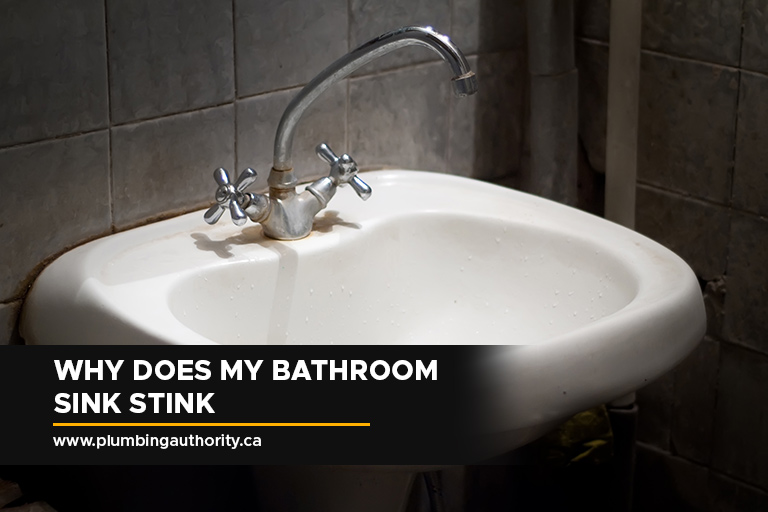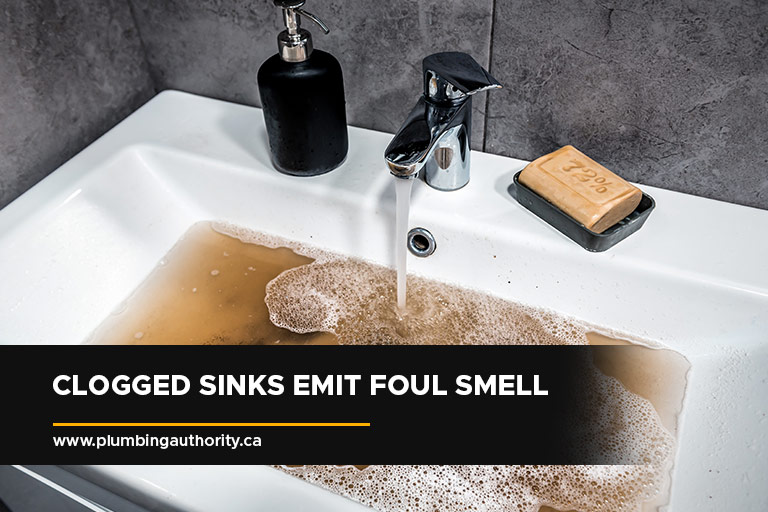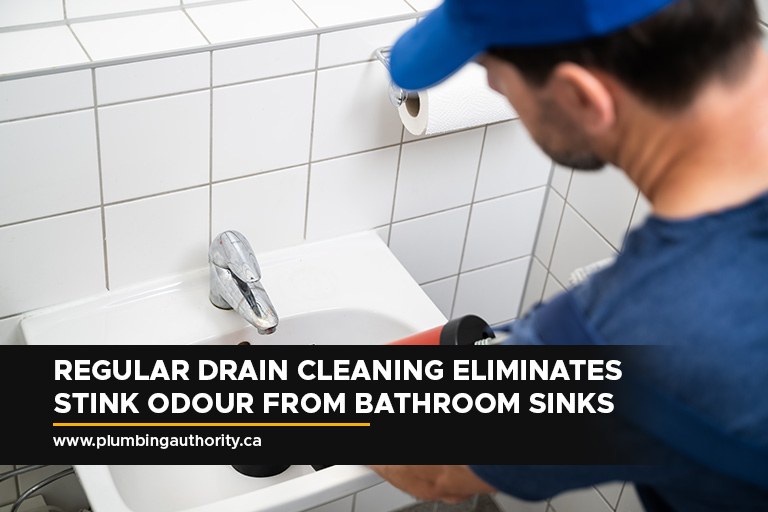
Let us face it; bathrooms can smell sometimes. However, if your bathroom sink smells like rotten eggs, this may indicate a serious plumbing issue. No matter how you clean it, the smell persists.
While potpourri and scented candles may temporarily cover the unpleasant odour, you need to address and resolve the root cause of the problem. Properly cleaning and regular drain maintenance can effectively prevent stinky bathroom sinks
What Causes Unpleasant Odour in Bathroom Sinks

Clogged sinks emit foul smell
You may have scrubbed the sink, poured drain cleaner, and taken out the trash, but the smell remains persistent. It can be revolting, leaving you wondering “Why does my bathroom sink smell bad?”
Here are the most common causes of foul smell from your sink:
- Dry P-Trap
A P-trap is a set of U-shaped pipes located under the sink that prevents nasty sewage odours and pests from infiltrating the house. Eventually, P-traps can dry out and leak an unpleasant smell into the bathroom. A dried P-trap can be caused by several factors, such as clogs, hot weather, or sinks that have not been used in a long time.
- Hair and Soap Buildup
Bathroom sinks gather various stuff like toothpaste, soap, hair, and shaving cream. Most of it goes down smoothly, but some sticks to the pipe walls. When soap, hair, and other things pile up, it can lead to smelly sinks in the bathroom.
- Clogged Sewer Line
Over time, too much accumulation of soap and hair can move deeper into the pipes. This can lead to a more significant blockage that is challenging to address with a basic manual tool and baking soda. The substances causing the blockage not only emit an odour but may also result in a gas leak from the P-trap, producing a noticeable smell.
- Ventilation Issues
Every residential plumbing system needs proper vents directing bad sewer smells outside, preventing them from spreading inside. If these vents don’t work, the odours find another way, often coming up through sinks and into bathrooms. Blockages in vent pipes can happen when dust, leaves, or other outdoor debris end up on your roof.
- Built-Up Bacteria
Bathroom sinks are frequently used for washing hands, shaving, and brushing teeth. These activities generate waste that goes down the drain, creating a suitable setting for bacteria to thrive. Over time, this bacteria can develop into biofilm—a combination of bacteria and accumulated material from waste, resembling black slime.
To inspect bacterial growth in your sink, unscrew and remove the sink stopper. Examine the stopper components for any indications of biofilm. If you observe black slime or debris buildup, biofilm is likely flourishing in your sink drains.
- Mould or Mildew Growth
Mould and mildew often thrive in bathrooms due to the warm, humid conditions. This environment is perfect for their growth. As they accumulate, they can produce unpleasant odours. While you might easily spot and address their presence in the shower, it is less likely that you will notice these problems when they occur in the sink drain.
- Problem With the Sewer Line
Watch out for that sewer odour—it might signal a more significant issue with your plumbing. This could mean sewer gas is making its way up through your drain. Keep in mind that all the stuff you flush down your pipes ends up in sewage. Basically, your bathroom sink connects with the sewer line from the toilet somewhere along the way.
- Sulphates
If your sink smells like rotten eggs, there could be excess sulphate in your water. While not harmful, sulphates might harm clothes and lead to digestion problems if swallowed. Additionally, an abundance of sulphates can lead to drainage issues, causing the odour from both the sulphates and a potential blockage.
- Plumbing Errors
Sometimes, you may detect an unpleasant smell shortly after getting plumbing work completed or new pipes put in. This could be because of a mistake made during the plumbing job, like a pipe that’s leaking or a missing part. If you catch a foul smell emerging from your bathroom sink drain soon after a plumbing service, reach out to your plumber to ensure they re-check the job.
How to Fix a Stinky Bathroom Sink

Regular drain cleaning eliminates stink odour from bathroom sinks
Fortunately, dealing with unpleasant smells in sinks is usually quite manageable without seeking professional help. If the problem is caused by a simple buildup or blockages, there are simple solutions that can eliminate the bad odour.
- Hot Boiling Water
Use hot water to clear blockages in the drain pipes. They can be easily removed by pouring hot water down the drain. Hot water can reduce the size of large blockages. To quickly get rid of bad smells and maintain a fresh home, mix in some essential oils or lemon juice with hot water before pouring it down.
- Keep the Drain Clean
Regular drain cleaning helps keep bad smells at bay. To do this, pour a mixture of boiling water and lemon down the drain once a week or put lemon peels in the garbage disposal. Both methods effectively eliminate odours that build up over time.
- Plunger
Plungers help with blockages in stinky pipes throughout your house, not only in the bathroom. Add some water to the sink, then use the plunger for around 20 seconds. Be sure to cover the second drain. When you raise the plunger, let the water flow into the pipe smoothly, avoiding any air gaps. This pushes the blockage down the pipe.
- Baking Soda and Vinegar
When dealing with stubborn clogs, use baking soda and vinegar. Begin by boiling water and then gather your supplies. If you have a second drain in your sink, be sure to cover it. Pour a cup of baking soda followed by a cup of vinegar down the drain. This triggers a chemical reaction that effectively breaks down the clog. To complete the process, flush the solution away with the boiling water.
- Flush Water Down the Pipes Often
If you notice a bad smell like rotten eggs coming from your sink, a simple solution for dry p-traps in drains that aren’t used often is to run water down them occasionally. Just make sure to pour some water down these drains at least once a week to keep the p-trap damp and prevent the unpleasant odour.
- Clear the Venting Pipes
Inspect the debris on your roof; it could be causing blockages in your venting pipes. While some homeowners try to remove debris on their own, it is better to seek help for roof clearing. Experts are skilled at identifying venting pipe blockages.
- Preventive Maintenance
Maintaining your plumbing through regular checkups by skilled plumbers keeps everything flowing smoothly. These checkups happen once a year and will not disrupt your schedule.
We hope that these tips have been useful as you address and get rid of unpleasant odours, be it from your drains or other sources.
When to Call a Professional Plumber
While some simple clogs can be addressed by DIY fixes, leave complex or hazardous plumbing issues, such as sewer line issues and incorrect plumbing installations, to a licensed local plumber in Caledon.
If attempts to address the odour on your own prove unsuccessful after a few tries, Plumbing Authority is here to help! We offer expert solutions to tackle the root causes of stink and enjoy a fresh and odour-free bathroom.
Give us a call today at (647) 992-7473 for reliable 24/7 plumbing services that make a difference. You can also fill out our Contact Us form to send us your message or concerns.




